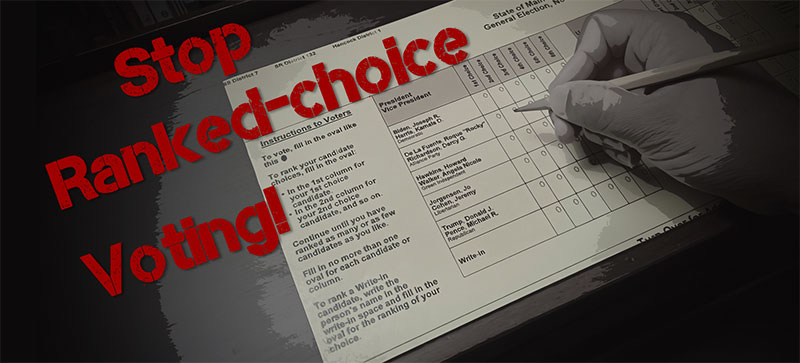
URGENT: Far-left Democrat Mary Peltola defeated conservative Sarah Palin in the special election for Alaska’s at-large congressional district. This is despite the fact that Peltola didn’t even win 40% of the vote in the first round, and Palin and fellow Republican Nick Begich won well over 50% of the vote. How did Alaska, a “red”-leaning state, elect a far-left Democrat? Because of ranked-choice voting, yet another method the Left is using to rig elections in their favor.
Additionally, leftist Republican Senator Lisa Murkowski is likely to win her election — despite her unpopularity among conservatives — solely because of Alaska’s ranked-choice voting system. Contact your state legislators and urge them to oppose any variation of ranked-choice voting! And if your state holds popular referendums, tell them to reform or (better yet) end this “democratic” system to prevent the Left from rigging our elections.
The Left is attempting to implement ranked-choice voting (RCV), also called instant runoff voting (IRV), in each state. RCV threatens election integrity and undermines the electorate’s ability to choose the best candidate in elections.
The May 10, 2021 issue of The New American magazine explains how ranked-choice voting works and why it is a bad idea:
[It] is a complicated system that requires voters to assign a rank to each candidate on the ballot, regardless of whether they support that candidate. If no candidate is ranked first by a majority of voters, the lowest-performing candidate is eliminated. Voters who gave their highest ranking to the eliminated candidate then have their second choice counted instead. This process repeats until one candidate receives a majority.
As implied above, ranked-choice voting can lead to candidates with little genuine support winning elections. The system confuses voters, distracts from policy issues, and forces voters to vote for candidates they otherwise would not support. In the United States, ranked-choice voting was enacted in Maine in 2016 and Alaska in 2020. These efforts, primarily backed by liberals, led to Republican U.S. Representative from Maine Bruce Poliquin losing to Democrat Jared Golden in 2018 despite winning a plurality in the first round. Meanwhile, some political analysts believe that Alaska’s new system, which also eliminates party primaries, will enable liberal Republican Senator Lisa Murkowski’s reelection in 2022 despite her unpopularity among Republicans.
With any voting system, the more complicated it is, the greater the risk of manipulation strategies or fraud. Additionally, RCV would make hand counts much more difficult, creating an excuse for computerized vote counting. By contrast, genuine election integrity must involve hand-counted paper ballots.
Ranked-choice voting is already being implemented across the country. As mentioned above, Maine and Alaska have already implemented it statewide. Meanwhile, Nevada will hold a referendum on the issue in November, and there have been attempts in multiple other states, including North Dakota, Massachusetts, and Missouri.
Meanwhile, dozens of cities nationwide — including New York City, San Francisco, Salt Lake City, and Minneapolis — have implemented RCV, and multiple states have enacted legislation allowing RCV to be used on the local level.
Contact your state legislators and urge them to oppose all attempts to enact ranked-choice voting, whether on the state or local levels.
















